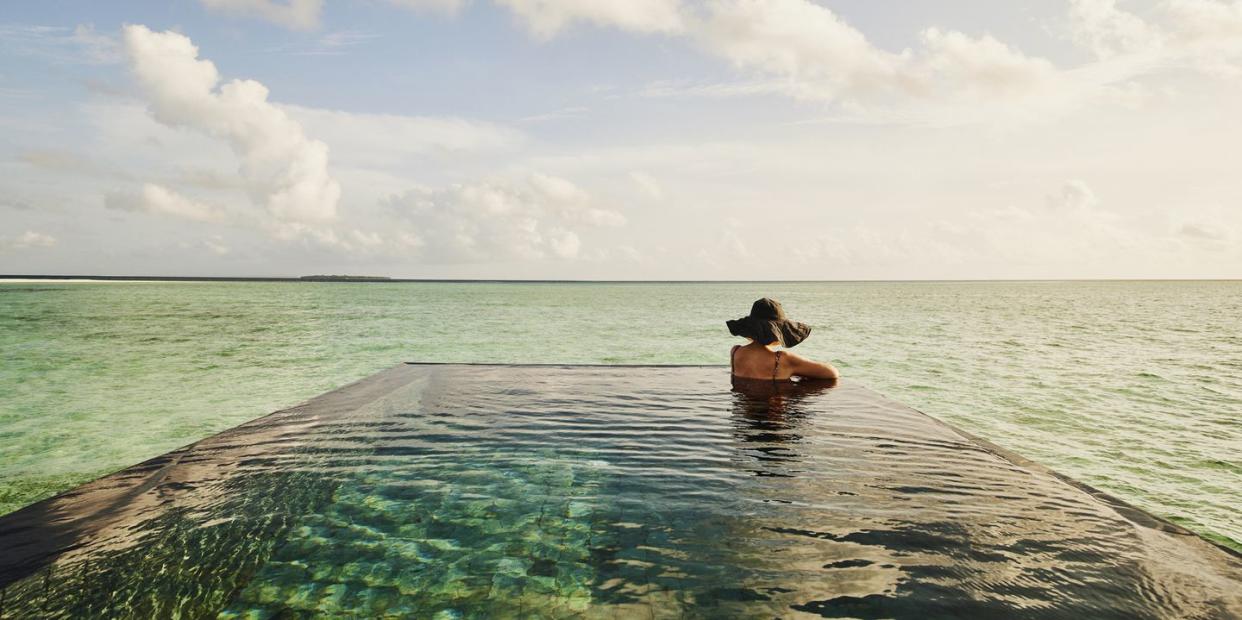How to Travel Well Without the Guilt, According to Wealth Experts

"Hearst Magazines and Yahoo may earn commission or revenue on some items through these links."
Here at VERANDA, we’re big fans of travel. Each year we curate extensive lists from the world’s most beautiful hotels to the best wellness retreats to help our readers pick destinations that will not only help them unwind but also enrich their lives and feed their creative spirit. While we truly believe in the saying, “Travel is the only thing you buy that makes you richer,” we also recognize that not everyone can jet off to a luxury vacation in Thailand on a whim.
That’s why we tapped Lauren Pearson, CFPP, and Emily Lassiter, JD, who are both financial advisors at Somerset Advisory, co-founders of The Wealth Edit, and authors of The Wealth Edit Guidebook. These two wealth experts know a thing or two about budgeting, and they’re sharing their best tips for saving and splurging on travel with us.
How to Decide Where to Stay on Vacation
Whether you’re dreaming of a week in the Caribbean or a summer in Italy, you’ll want to identify a vacation that aligns with your timeline and budget. If you have a flexible or remote work schedule, long-term rental properties—like those found on Airbnb or VRBO—can be much more cost effective than luxury hotels and allow you to extend your trip without sacrificing comfort. Additionally, many countries offer 90-day visas for tourists from the U.S., which is ideal for spending a few weeks (or even a season) abroad.
“For my family, the greatest luxury is time, so the first thing we look at is how long we can get away and create an experience,” says Pearson. “We figured out when our kids were pretty young that we could travel to Europe and rent a place for a month for the same price as American adventure parks for the week. We have traveled to Greece and France in the summer and both times have found beautiful places as a home base, and then we take day trips or overnights from there.”
How to Budget for a Luxury Vacation
No matter where you’d like to go or how long you want to spend there, it’s important to first determine your budget. To do this, Pearson first recommends “reminding yourself of the intention of the trip, or the meaningful reasons you travel.” For example, do you want to prioritize spending money on flying in first class, staying at a well-appointed luxury hotel, eating at Michelin-starred restaurants, playing rounds of golf at beautiful courses, or going on other excursions? Once you’ve determined your intentions and priorities, you can budget more money for those—and cut costs in other places.
Pearson says, “For a luxury vacation, you want something that feels carefully curated for you and your travel partners. From there, you want to make sure you’ve done your research and know how much your dream trip is going to cost.” Once you’ve calculated the cost of flights, hotel, and activities, Pearson says you should also “build in a buffer of 20 to 25% [of the trip’s cost] for the unexpected.”
Beyond the big-picture trip details, you should also consider adding in a little extra money for the things you’ll be leaving behind (you may need to pay for services like a babysitter, doggy day care, mail services, a gardener, or someone to keep an eye on your house). You should also think about other sneaky expenses like vacation outfits and special items you may need for your trip (think: outlet converters or a travel bag for your golf clubs). Though it may seem like $20 here or there is no big deal, over time it definitely adds up.
Lassiter also recommends budgeting a little extra money for souvenirs. “Since college, every time I have taken a trip to somewhere new, I’ve budgeted dollars into the trip to buy a keepsake.” She adds, “The keepsakes chosen were mainly items I could use to add character to my home. Sometimes it was a piece of art, and other times it was textiles or tableware. These keepsakes are now some of my most prized possessions and make my house feel like home.”
While budgeting for a trip—down to your dog sitter and souvenirs—may seem a bit tedious, it will actually help take out the stress and guilt from your vacation and allow you to be present and enjoy your time away. Pearson says, “The idea of traveling well is not something you need to sacrifice if you have planned well.”
Why Travel Is a Smart Investment
Lassiter adds that though travel requires some thorough planning and can be very expensive, she views it as a worthy investment. She says, “One of my most important parenting goals is to create lasting memories and, for my family, travel has been the best way to do this. I have never regretted the dollars I spent on trips planned with this goal in mind.” She adds, “Some [people] questioned my decision to travel with young children, but in my mind what greater investment can I make in myself and my children than the opportunity to see the vastness of this world and the diversity of cultures? Now, as my children get ready to start their next chapter into adulthood, I am getting to see the fruit of this investment and love that they are choosing to prioritize travel as well.”
Both experts agree that travel is an investment that pays dividends—you just have to do some proper planning so you can enjoy your vacation without any of the guilt.
You Might Also Like